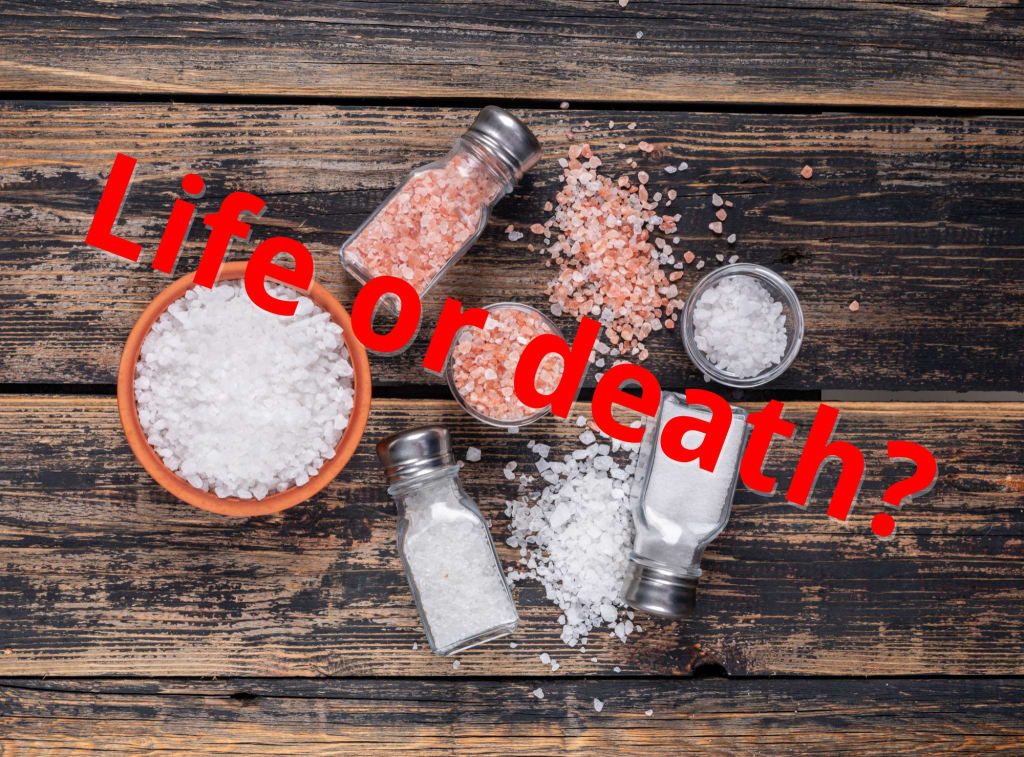Salty Business: The Good, The Bad, and The Tasty
The True About How It Went From Ancient Currency to Iodized Seasoning - The Salty Tale of Salt

In the Ancient Tale, the princess tells the king that she loves him no less than people love salt. The king is very offended by this and sends his daughter into exile. But how is this salt in our world?
Salt, a mineral composed primarily of sodium chloride, has been an essential part of human history and civilization for thousands of years. From preserving food to seasoning meals, salt has played an important role in human nutrition and cultural traditions. In this article, we will explore the history, different types, benefits and risks to health, recommended daily doses, and which type is the most healthy.
History of Salt
The use of salt dates back to ancient times, with evidence of salt mining dating back over 8,000 years in what is now Romania. Salt was highly valued in ancient civilizations, with the Egyptians using it in religious ceremonies and the Romans using it as currency. Salt was also an important commodity for trade, with salt roads and salt caravans connecting different regions of the world.
During the Middle Ages, salt was used for food preservation, as refrigeration did not exist. It was also used as a means of taxation, with governments imposing a salt tax. In fact, the word "salary" comes from the Latin word "salarium," which means "salt money."
Different Types of Salt
There are several different types of salt available on the market, each with its own unique flavor and texture.
1. Table Salt: This is the most common type of salt, which is highly refined and processed to remove impurities. It is usually fortified with iodine, a mineral essential for thyroid function.
2. Sea Salt: This is made by evaporating seawater, leaving behind the salt crystals. It is less refined than table salt and contains small amounts of minerals like magnesium, potassium, and calcium.
3. Kosher Salt: This type of salt is flakier and coarser than table salt and is often used in Jewish cuisine. It is less dense than table salt, so a pinch of kosher salt contains less salt than a pinch of table salt.
4. Himalayan Salt: This is a pink-colored salt that is mined in the Himalayan region of Pakistan. It contains trace amounts of minerals like magnesium, potassium, and calcium and is often used as a decorative salt.
Benefits of Salt
Salt is essential for human health, as it helps to regulate fluid balance in the body, aids in muscle function, and helps to transmit nerve impulses. It is also an important component of the digestive process, as it aids in the production of stomach acid.
Salt is also important for preserving food, as it inhibits the growth of bacteria and other microorganisms that can spoil food. This has been a critical factor in human survival throughout history, as salt has allowed people to store food for long periods of time and survive harsh winters and food shortages.
In addition, salt has been used for medicinal purposes throughout history. It has been used to treat skin conditions, respiratory problems, and even as a natural antihistamine.
Risks to Health
While salt is essential for human health, consuming too much salt can be harmful. Excess salt intake has been linked to a variety of health problems, including high blood pressure, heart disease, stroke, and kidney disease.
High salt intake can cause the body to retain fluid, which can lead to high blood pressure. This puts a strain on the heart and can increase the risk of heart disease and stroke. In addition, excess salt intake can also damage the kidneys, leading to kidney disease.
The recommended daily dose of salt varies depending on age and health status. According to the American Heart Association, adults should consume no more than 2,300 milligrams (mg) of sodium per day, which is equivalent to about one teaspoon of salt. However, individuals with high blood pressure, kidney disease, or diabetes may need to consume less salt.
Which Type of Salt is the Most Healthy?
When it comes to choosing the healthiest type of salt, it is important to note that all types of salt contain sodium, which is the main component that can be harmful if consumed in excess. However, some types of salt may contain trace amounts of minerals that can provide additional health benefits.
Sea salt and Himalayan salt, for example, contain small amounts of minerals like magnesium, potassium, and calcium. While the amounts are minimal and may not make a significant impact on overall health, these minerals do provide some nutritional value.
Kosher salt and table salt, on the other hand, are highly refined and processed, which removes any trace amounts of minerals. However, table salt is often fortified with iodine, which is an important nutrient for thyroid function. Therefore, if choosing between table salt and kosher salt, it may be better to choose table salt to ensure adequate iodine intake.
It is also important to note that while sea salt and Himalayan salt may contain some trace minerals, they are not a significant source of these nutrients. It is always better to obtain nutrients from whole foods rather than relying on trace amounts found in salt.

In conclusion, salt has played an important role in human history and nutrition for thousands of years. While it is essential for human health, consuming too much salt can be harmful and has been linked to various health problems. The recommended daily dose of salt is about one teaspoon of salt, but individuals with high blood pressure, kidney disease, or diabetes may need to consume less.
When it comes to choosing the healthiest type of salt, all types of salt contain sodium and should be consumed in moderation. Sea salt and Himalayan salt may contain trace amounts of minerals, but they are not a significant source of nutrition. Table salt is often fortified with iodine, which is an important nutrient for thyroid function, making it a better choice than kosher salt in terms of nutrient content. Ultimately, the best way to obtain nutrients is through whole foods rather than relying on trace amounts found in salt.
If salt, this is my recommendation, simply the best :)
with love,
Blaise

About the Creator
Laszlo Hatvani
To be useful in the world, - I already felt this as a moral foundation in my childhood. In my opinion, the purpose of art is not only self-expression, but rather the improvement of the world and people through given experience.






Comments
There are no comments for this story
Be the first to respond and start the conversation.